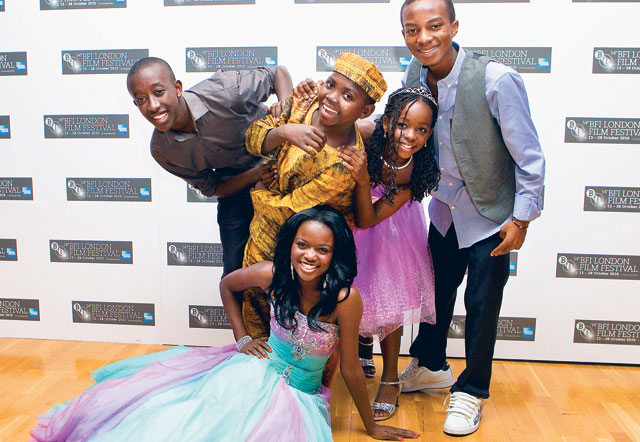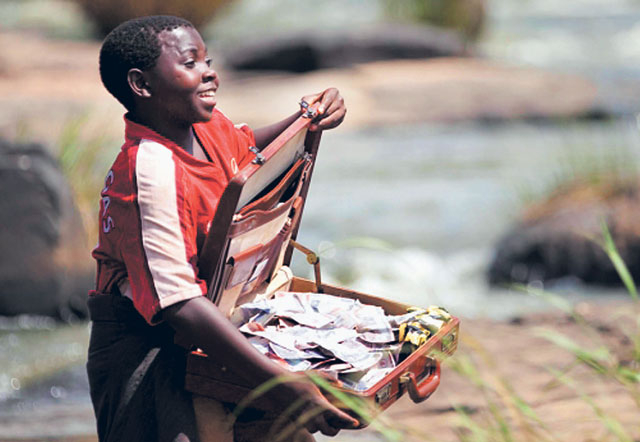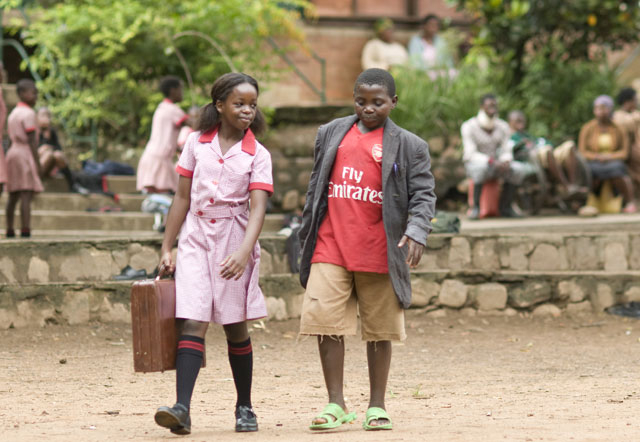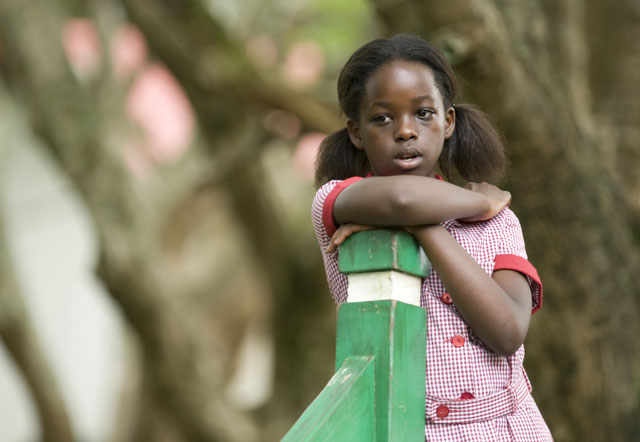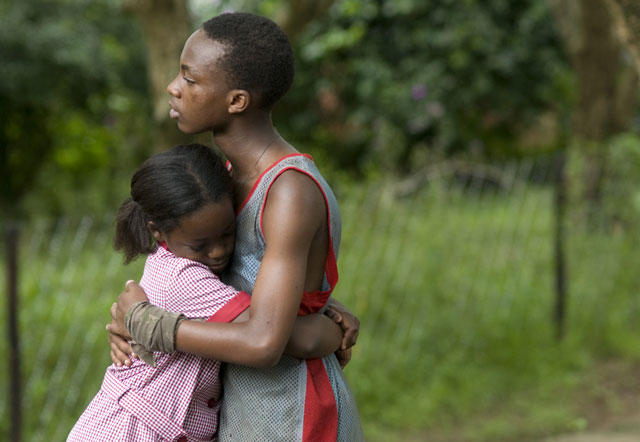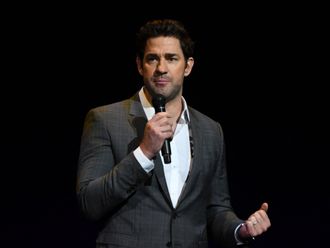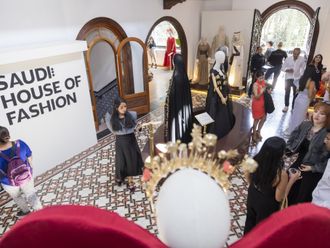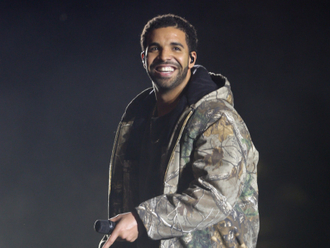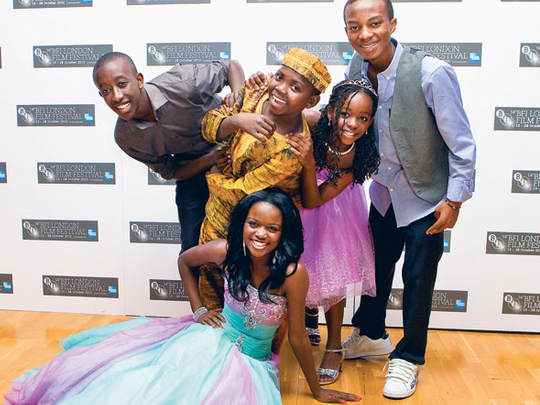
Among the recent flurry of mainstream films set in Africa there has been an inescapable common thread. Blood Diamond, The Last King of Scotland, Shooting Dogs and The Constant Gardener — all well received, all acclaimed and all with white protagonists heroically engaging with a dangerous and savage continent.
That pattern may be about to change. Last week, five young, unknown Africans walked up the red carpet in London's Leicester Square to the British premiere of a film which discards the usual Hollywood stereotypes.
Africa United, dubbed "the rookies' project" by its makers, features a cast of children aged 11 to 15 who had never acted before; a writer producing his first script and a director making her first feature film.
It has already been compared favourably to Slumdog Millionaire and, indeed, is being distributed by Pathe, the company behind Danny Boyle's Oscar-winner. The former Sudanese child soldier-turned-rap star Emmanuel Jal, who plays a villain, is the only name audiences may recognise and for him, it was an acting first.
Africa United is a road film about five children who travel 4,828 kilometres to reach the 2010 World Cup in South Africa. Their backgrounds are as diverse as the continent — Fabrice, a middle-class football protégé; Dudu, a Rwandan Aids orphan with a true sense of determination; Beatrice, his God-loving and gentle little sister; Celeste, a proud teenage sex worker; and Foreman George, a traumatised former child soldier from the Democratic Republic of the Congo.
The early screenings have seen rapturous acclaim for the performances and at the Toronto Film Festival recently, it won a standing ovation. "That was an insane moment and a big relief," said director Debs Gardner-Paterson.
But it was the timing of Africa United, coming after the huge success of the 2010 World Cup, amid signs of growth and peace across many of the continent's nations, that made it so important, said Gardner-Paterson.
"There's a whole side to Africa that is just not being seen. It's such a trick to pull off but what we hoped was to make a family film that doesn't avoid that side of things. Show children here that there are children like you in other situations who are incredible human beings. There are so many good stories and so many great people — entrepreneurial, clever, joyful. There is so much ingenuity and creativity, it's outrageous.
"My cousin, who is 14, read the script and said, ‘You've got it wrong, this child has a mobile phone, you don't get that in Africa.' I was like, yes you do, and that's the point. There's a whole side of Africa you just don't see."
Her mother was raised in Rwanda and Gardner-Paterson was determined to shoot in the country, along with scenes filmed in South Africa and Burundi. Africa United became a British-Rwandan co-production.
"The scenery is off the chart, amazing, and I felt it was morally wrong to just settle for filming the whole thing in South Africa because it was easier," she said.
The impetus for Africa United came from Eric Kabera, a Rwandan raised in a refugee camp in Congo, who has made himself a driving force in developing the East African film. For him, too, the timing for such an uplifting film was right.
"I go to film festivals and people say, ‘Here comes the genocide guy', because my work has focused so much on that period. But now it is time to show different stories from Africa. There is more here than civil war. Let's not brush over the issues but let's not ignore the hope. This film is a transit point for people to start looking differently — through the eyes of children — at Africa. The football is just a metaphor but I hope it will unleash many more stories from the continent."
But not all stories about Africa are found in Africa. One of the most remarkable twists the production of the film took was the search for the boy who would play Fabrice. The role required remarkable footballing skills along with the acting. And with just five weeks to go before shooting began, the original choice pulled out.
Enter the African migrant. Producer Mark Blaney was in Norwich for Christmas when his mother-in-law handed him a newspaper cutting. A local boy whose mother had fled the 1994 genocide in Rwanda was trying out for Norwich City.
"It was a complete fluke. Luckily, there weren't too many Rwandan surnames in the Norwich phone book," said Roger Nsengiyumva, 16.
His mother, Illuminée, had been a bride for only two days when violence erupted. Within a month, her Tutsi husband John had been murdered by the same Hutu neighbours who had celebrated the couple's future. By 1996, she had found her way to Norwich with her baby son.
Within weeks of Blaney finding him, Nsengiyumva was on a flight back to his homeland and struggling to learn an African accent and work out how to act.
"It was scary but once I got into the swing of it, I loved it. It's definitely what I want to do," said Nsengiyumva, who has already gone on to complete another acting role in a BBC drama.
"In Africa United, I was playing who I might have been if I'd stayed in Rwanda, although my character Fabrice is really quite well off. But I do think about who I might have been without the education I've been able to get in England."
Fabrice is spotted by a football scout looking for young players to represent Africa at the World Cup ceremony in Johannesburg and told to turn up at an audition in the Rwandan capital, Kigali. A wrong bus leads to the epic journey.
In line with storytelling traditions, the character Dudu's thoughts are shown in animation, something which was in the original screenplay, said writer Rhidian Brook. "When the producers called me in to talk about it, there was a desire to do a film about Africa that wasn't about a catastrophe or a safari. I had been travelling with my family for a year and living in places affected by Aids and I don't think I could have written this film without doing that. I wrote about the journey first in the book More Than Eyes Can See."
The novelist, better known for the award-winning The Testimony of Taliesin Jones, wrote the screenplay just over a year ago and admits that football is not what the film is really about.
"Football in a way is just ‘the McGuffin'," he said. "We had come up with a pitch line which was strong: Five kids walk 3,000 miles to get to the opening of the World Cup." Dudu, the orphan with the briefcase and a line in malapropisms, was the first character to take shape. In the film, he is played by Ugandan Eriya Ndayambaje, now aged 14.
"I thought it was very African to have a story within a story but some of the producers were worried it might hand-brake the drama," Brook said. "I am very glad we kept it. All the children acting punched above their weight. It was a huge gamble and so all credit to Pathe for gambling on it.
"It is a rookie film, really. We are all rookies, as this is my first screenplay and the director's first film. This, we think, was the first film shot in Burundi."
He said Slumdog Millionaire, with its similar theme of the underdog triumphing over adversity, was the reason they took Africa United to Pathe.
"Slumdog was a very slick film and Danny Boyle is a brilliant director," Brook said, "but this is more engaging, I think, because we have got five very strong characters. It all comes down to creating characters you care about."
Like Slumdog, the makers of Africa United have been very conscious of the issues of working in a developing country and insist all the children, none of whom come from destitute or slum backgrounds, have been carefully looked after.
Pathe is donating 25 per cent of the film's net profit to Comic Relief. So Africa United stands to change not just the mind-sets of British audiences and the fortunes of its talented cast but it will also put back into the places from where the story sprang.
As Dudu says in the film: "Impossible is nothing."


